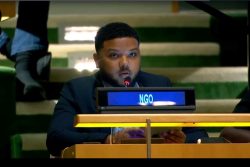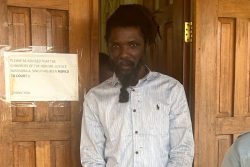Head of the Presidential Secretariat and Cabinet Secretary Dr Roger Luncheon said on Wednesday that there had been division between former President of Guyana Bharrat Jagdeo and some members of the cabinet during his 2006-2011 term on account of him favouring exploration and mining activity in the New River Triangle.
However, former Chief of Staff, Major General (rtd) Joseph Singh recalled in a letter published in Stabroek News on Friday that as president Jagdeo had vetoed any natural resource extractive industries in the New River Triangle.
Luncheon made his disclosure during an impromptu interview at the end of his official press conference held at the Office of the President on Wednesday morning.
“We are divided and this division does not extend to all other levels other than Cabinet. So we have indeed over the last …I think it was the 2006 term… former president Jagdeo did indeed discuss the issue of mining and exploring in the New River Triangle… At that time the president had a strong position that was not consistent with others in the cabinet but we are an advisory body you may recall, and therefore there was the president’s view which held sway. That was 2006 to 2011,” he said. “I am not saying anything further…2006 to 2011,” he repeated.
At an earlier point he had addressed the matter of objections by the GDF to the extraction of minerals and related activities in the New River area.
“You need to appreciate that our
civilian-military engagement is that policy-making in these areas isn’t dependent on objections and refusals by the military. That is alien to our understanding of
civilian-military relationships. In essence the notion that this civilian-military relationship preserves some right, some influence on the actions and policy decisions made by the civilian government needs to be examined carefully,” he said.
“I am not aware that the GDF had made an objection. I am unaware and I dispute… I don’t believe that you are going to get over the last three terms of the military leadership… that is under three successive chiefs of staff, any reports from any one of them, that they were consulted and they made objections,” he said.
“If they did,” Luncheon continued, “it wasn’t to me or to the Commander in Chief.” He said that he wasn’t aware of the military objecting to any development in the New River Triangle area: “I wouldn’t go so far as to deny it, but I would go as far as saying the HPS don’t know what you talking about.”
He went on to say that in the civilian- military dispensation that the government embraces, there is an obligation to respond with respect to a civilian order. “So if the Commander in Chief were to announce to the military… were to announce to this nation ‘this is the government policy,’ under our understanding of civilian-military relationship the matter is done,” he told reporters.
He said that he was uncertain whether there ever existed an explicit policy on mining or other activities taking place in disputed areas.
In a letter to the editor which was published in Stabroek News, former GDF Chief of Staff, Major General (rtd) Joseph Singh made statements not all of which appeared to be fully in consonance with what Dr Luncheon had said.
He wrote that he was aware that government’s policy had been that no permits were being granted for natural resources extractive activities in the New River Triangle.
“As an example, I referred to when the GDF’s monitoring operations by air and ground-truthing patrols had identified alluvial mining activities in 1993 in the headwater tributaries of the Oronoque River, itself a tributary of the New River. It was brought to the attention of the Defence Board which then approved funding for a major operation to deal with this breach. The record will show that a GDF-mounted joint operation, using the element of surprise, interdicted a Brazilian civil-registered light aircraft and several nationals of Brazil at an illegal airstrip within Guyana’s territory,” he wrote; “The airstrip, constructed in a primary forested area, was subsequently destroyed by
cratering and trenching. The aircraft and persons were brought to Georgetown where charges were laid and fines levied but subsequently waived as an outcome of diplomatic bilaterals between Guyana and Brazil.”
“One other outcome of this incident was an agreement for the mounting of joint GDF/Brazilian Armed Forces patrols along the Guyana-Brazil frontier to identify and interdict any illegal mining operations,” he said in his letter.
According to Singh, the GDF has an obligation as an aspect of its operational contingency planning to advise the Defence Board as to the security implications of infrastructure development and extractive activities in any part of Guyana. “However, and in the final analysis, it is the government, not the GDF, that is the determinant as to whether or not extractive activities will or will not be permitted,” he said.
Singh noted that with specific reference to the New River Triangle, then President Jagdeo had vetoed any natural resources extractive activities in that area. “His decision, I am informed, was based on the fact that given the exploitation of natural resources in the rest of Guyana, the New River Triangle is the only area where the integrity of ecosystems and biodiversity could be preserved and bequeathed to future generations,” Singh wrote.








